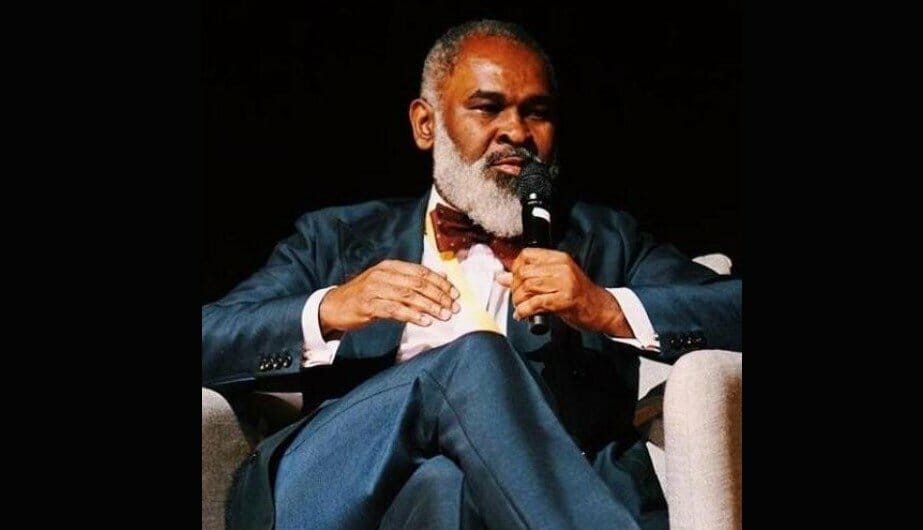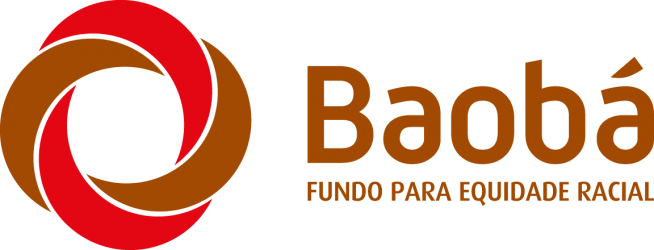In an interview, former deliberative council’s chairman speaks of Baobá’s accomplishments
By Ingrid Ferreira and Wagner Prado
On December 9, the Baobá Fund for Racial Equity underwent a major change in its executive direction. Giovanni Harvey, chairman of the deliberative board since 2018, became the executive director of the organization.
In an interview for the Baobá Fund newsletter, Harvey talks about his professional trajectory, his expectations, contributions and future plans for the Baobá Fund, as the person in charge of the executive management.
You left the Deliberative Council in order to administer the Baobá Fund for Racial Equity’s Executive Board. How will your experiences as Chairman of the Board contribute to your performance as the Executive Director?
Giovanni Harvey – My professional relationship with the Baobá Fund began in 2017, when I was hired to structure the institution’s Strategic Plan for the 2017 to 2026 cycle. After concluding that task, I was invited to join the deliberative council and in 2018, I was elected president of the aforementioned board. In April 2021, I was re-elected for a second term, until 2024, when I resigned in order to take on the executive board office.
In 2017, in order to carry out the consultancy, I had to study the entire history of the Baobá Fund, seeking to understand its functioning processes, define the main objectives, learn about its potential and identify the challenges. The work included conducting a series of interviews with the founders, partners and funders. It was based on this knowledge, along with my experience over the last 30 years, that I was able to become the chairman of the deliberative council.
The roles I had on the deliberative board are different from those I will play in the executive board. The deliberative council is responsible for formulating the institutional strategy, the political representation (in a broad sense) of the Baobá Fund as well as the social control of management. The executive board is responsible for the operationalization of the strategy outlined by the deliberative council, the institutional articulation (in a strict sense), for managing the endowment and for the implementation of established programmatic guidelines.
I believe that my career at the Baobá Fund, combined with the experiences I have had as a manager of companies, social organizations and public policies (at the municipal, state and federal level) will contribute to my being able to continue the work that was developed throughout the last seven years by my predecessor, the executive Selma Moreira.
As the executive director, what are your goals for the Baobá Fund?
Giovanny Harvey – A goal is the quantified objective. Based on this premise, I plan to increase the endowment towards an estimate of R$250 million, which will allow us to make annual withdrawals capable of meeting the most sensitive demands of organizations and people who work in the black movement.
The Baobá Fund has interventions centered on context analysis and active listening to the field. In other words: calls for proposals are elaborated as necessities are mapped. Is Baobá concurrently empirical and scientific?
Giovanni Harvey – The Baobá Fund’s strategic objective is to make financial resources available, derived from the endowment´s fund revenue percentages that may be withdrawn annually. It may also utilize the funding that is raised with individuals and legal entities in order to finance (through non-refundable donations) organizations, groups, collectives and black leaders that struggle against racism, support the defense and assurance of rights and promote racial equity.
The quality of the financial resources offered to these organizations and people by the Baobá Fund depends mainly on three factors:
- Alignment of the Baobá Fund’s program guidelines to the demands of black organizations, groups, collectives and leaders;
- Degree of autonomy of the Baobá Fund to direct resources towards the aforementioned demands made by black organizations groups, collectives and leaders;
- Assessment of achieved results.
These three factors demand, not only from the Baobá Fund, but from any institution that seeks to intervene in the struggle against structural racism, and the asymmetries based on ethnic prejudice and discrimination, a combination that involves legitimacy, scientific knowledge and capacity to dialogue with black people who lead initiatives to combat racism and promote racial equity in diverse sectors of society. Added to this is the ability to listen, dialogue and positively contribute to building consensus within the ecosystem of philanthropy, private social investment, the Network of Funds for Social Justice and international cooperation.

The creation of the Investment Committee, among other developments, have led the Baobá to build an endowment of over R$60 million. What number figures you planning to achieve?
Giovanni Harvey – The establishment of the Investment Committee, formed by three top-level professionals (Felipe Souto Mayor, Leonardo Letelier and Gilvan Bueno) reflects the Baobá Fund’s level of institutional maturity and its commitment to excellence in the management of the Endowment Fund.
In addition to the Investment Committee, we have a Fiscal Council (Mário Nelson Carvalho, Marco Fujihara and Fábio Santiago) that has contributed with recommendations that resulted in adopting the best compliance practices.
Under the security provided by these institutional foundations, as well as their reputation, I will work towards the R$250 million reais endowment.
Beyond the numbers, what are your aspirations as the new Executive Director?
Giovanni Harvey – I seek to continue the investment on the professionals who work at the Baobá Fund, contributing to the permanence of the fraternal and collaborative environment I have encountered. Moreover, I aim at expanding the use of technological solutions that allow us to improve institutional performance in the three dimensions defined in the Strategic Plan: mobilization of resources, institutional articulation and programmatic investments; contributing to the strengthening of institutions and networks operating in the field of philanthropy, private social investment and social justice.
Is there anything that Baobá has not done during your term as chairman of the board, and that you would want to implement?
Giovanni Harvey – No, there´s not, quite the opposite. The main reason that led the deliberative council to appoint me to succeed the executive Selma Moreira was to ensure the continuity of what has been accomplished. This is not the time to “invent the wheel” nor to “rock the boat”.
What is your analysis of the Donation Circle started by the Baobá Fund? What is the relevance of the roles played by Executive Gilberto Costa (JP Morgan) and Executive Rita Oliveira (The Walt Disney)?
Giovanni Harvey – The “Donation Circle” is a fundraising strategy developed by the Baobá Fund team, under the leadership of Selma Moreira, Fernanda Lopes and Ana Flávia Godoi. One of the premises of this strategy is the recognition of the role of black people in resource mobilization processes (in a broad sense) on behalf of Racial Equity. In this regard, the Baobá Fund has the privilege of counting on the engagement of two top professionals, Gilberto Costa who is Executive Director of Pact for Racial Equality and the Executive Director of JP Morgan and the Head of Diversity and Inclusion LatAm at Walt Disney Company, Rita Oliveira. They are engaged in the interventions and activities developed under the “Donation Circle” campaign.
Is the Baobá Fund confident in promoting the mobilization of a donation culture among individuals? Is it possible to foster this motivation on people who live in a country with such precarious economy?
Giovanni Harvey – The percentage of donations made by individuals to the Baobá Fund has been growing in recent years and all indicators point to the growth of this category of fundraising (with individuals and companies).
The contribution of individuals on behalf of Racial Equity is part of the history of Brazil and dates back to the struggle that black people undertook in search of freedom, as well as the numerous initiatives that constituted the abolitionist movement.
The process of building the propelling mechanism, funded by the Kellogg Foundation for nearly 15 years, which mobilized approximately 200 black people and/or organizations operating in Brazil´s northeastern region, resulting in the implementation of the Baobá Fund, had as its starting point the legacy of black philanthropy in the struggle against enslavement.
For these reasons, I am absolutely convinced that we are going to expand the engagement of individuals, investing in communication tools so that people may follow what we do with the resources we raise, and particularly, the results that are being achieved.
The contribution of individuals and withdrawing proceeds from the endowment fund were fundamental for the Baobá Fund to have the necessary resources to launch, the Emergency Call for Proposals in Support for Actions to Prevent Coronavirus in early April 2020. It was the first intervention of this nature carried out in Brazil, less than 30 days after the issuance of the first public calamity decree due to the pandemic. The Baobá Fund provided support to 215 people and 135 organizations that benefited from these resources.
Thinking in terms of donation, what plea would you make for people to donate?
Giovanni Harvey – The Baobá Fund has carried out a series of initiatives and campaigns aimed at mobilizing resources and, in my opinion, they have met all of our communication expectations.
The Deliberative Council is now honored by having Sueli Carneiro as its president and Amalia Fischer as vice-president. It is constituted by André Luiz de Figueiredo Lázaro, Edson Lopes Cardoso, Elias de Oliveira Sampaio, Felipe da Silva Freitas, Martha Rosa Figueira Queiroz, Rebecca Reichmann Tavares, Taís Araújo and Tricia Viviane Lima Calmon, is currently deliberating over this topic and, in due course, it will contribute so that the calls will be strengthen ongoing fundraising initiatives, carried out with a high level of dedication and professionalism.
My commitment as a manager is to continue investing in improving the Baobá Fund´s performance, in order to provide feedback to fundraising initiatives and campaigns with (increasingly more detailed) information on how resources are being used and with scientific indicators that demonstrate the results being achieved.
The Baobá Fund will continue to fulfill its institutional mission, strengthening ties with organizations, groups, collectives and leaders of the black movement that form its foundational base, along with the network that makes up the GIFE – Grupo de Fundos, Fundações e Empresas (Group of Funds, Foundations and Companies). We will work in order to strengthen and promote diversity in the philanthropy ecosystem in Brazil and abroad.
